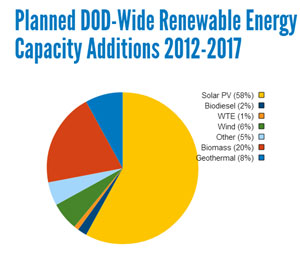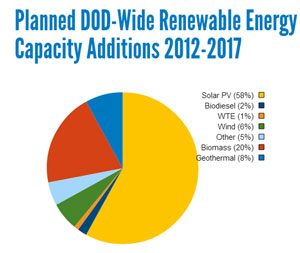The US Department of Defense (DoD) considers climate change an extremely serious threat to our national security. Since President Obama took office, it has set big goals and taken action on cutting emissions and transitioning to renewable energy.
But Republicans – symbolized by Trump at the moment – refuse to even take our Defense Department seriously on this issue. Instead, they have tried to block efforts to use biofuels for Navy ships and even tried to eliminate funding for research on how climate change will affect its ability to defend our nation.
In June, for example, House Republicans passed an amendment to DoD’s spending bill prohibiting it from spending any money on its climate plan. Not a single Democrat voted for it.
Obama, however, pushes on.
In September, he issued an executive order that requires climate change be fully incorporated into all national security policies and strategies.
20 federal agencies must immediately establish a working group that identifies US national security priorities that relate to climate change.
Within 90 days, these agencies must develop a “Climate Change and National Security Action Plan” that details how they will share information on climate science and vulnerability assessments for areas of the US under the greatest threat over the coming 30 years. Finally, each agency must develop strategies to address these threats, ranging from economic impact to food security and the flow of migrants and refugees.
Defense Reports All Point in the Same Direction
Two major reports on climate and defense were issued in September.
A report by the National Intelligence Council states that climate change is “likely to pose significant national security challenges for the United States over the next two decades,” including straining our military operations and bases.
Climate change threatens the stability of countries, heightens social and political tensions, increases health risks, jeopardizes food security, and negatively impacts economic growth, the report says. And these effects will become more pronounced as populations continue to concentrate in coastal areas, drought-prone regions, and other vulnerable areas.
A report by think-tank Center for Climate and Security,says: “There are few easy answers, but one thing is clear: the current trajectory of climatic change presents a strategically-significant risk to U.S. national security, and inaction is not a viable option.”
They are calling on the next US president to create a cabinet position specifically focused on the impact of climate change on national security.
National security officials view current action on climate change as “not commensurate to the threat,” according to the group’s executive, Francesco Femia.
Yet another group, the Climate Security Consensus Project, consists of 26 national security and military leaders. They are bipartisan, and have worked under Democrat and Republican administrations. Their statement starts by saying: “We the undersigned members of the US national security community conclude the effects of
climate change present a strategically-significant risk to US national security and international security,
and that the US must advance a comprehensive policy for addressing this risk.”
“Already, we’ve witnessed the instability and harm caused by rising sea levels, dramatic flooding, regional droughts, extreme heat, and severe weather events around the world. A devastating drought contributed to the early unrest and eventual conflict in Syria, as water shortages and crop failures led farmers to abandon their homes in search of more stable sources of food and water. More than 100 million people now live less than one meter above sea level, and the expected pace of sea level rise means that these people will be at increasing risk during this century,” say Susan Rice, National Security Advisor and Brian Deese, Senior Advisor to Obama.
Then there’s the Global Military Advisory Council On Climate Change, established in 2009 to examine global security ramifications from climate change. Members in active and retired military officers from around the world.
Major General Munir Muniruzzaman, who chairs the group, warns that climate change could “completely destabilize” the world by igniting major wars and forcing multi-millions of people to become refugees.
Countries that attempt to cope by resorting to “narrow nationalistic instincts” such as building walls, will only exacerbate the problem, he says.
As examples, he points to tensions between India and Pakistan over water supplies, and the connection between drought and crop failures and the Arab Spring and Syrian civil war. Rising sea levels in Bangladesh alone could create 30 million refugees in the coming decades.
“I would like to warn everybody we are way behind schedule to trying to find a solution to the problems we can see. In most cases we have been shying away from the problems we can absolutely identify and see,” he concludes.
Read our article, As Climate Change Worsens, So Will Human Violence.
Partnership for Resilience and Preparedness (PREP)
The State Department recently launched PREP, a public/private partnership that “enables collective action to manage climate risks.”
The new data-sharing platform will give non-profits and corporations access to troves of federal climate-related environmental information that can help them prepare for what lies ahead.
“With climate change already upon us, a growing number of communities, companies, and civil society organizations are looking to assess climate vulnerability and develop resilience plans,” PREP says. To do that, they need access to actionable data that’s easy to find and make use of.
And what do Republicans say? “The military, the intelligence community and domestic national security agencies should be focused on ISIS and not on climate change,” says Rep. Ken Buck (R-CO), sponsored of the June amendment that prevents DoD spending on climate strategy. “The fact that the president wants to push a radical green energy agenda should not diminish our ability to counter terrorism.”


